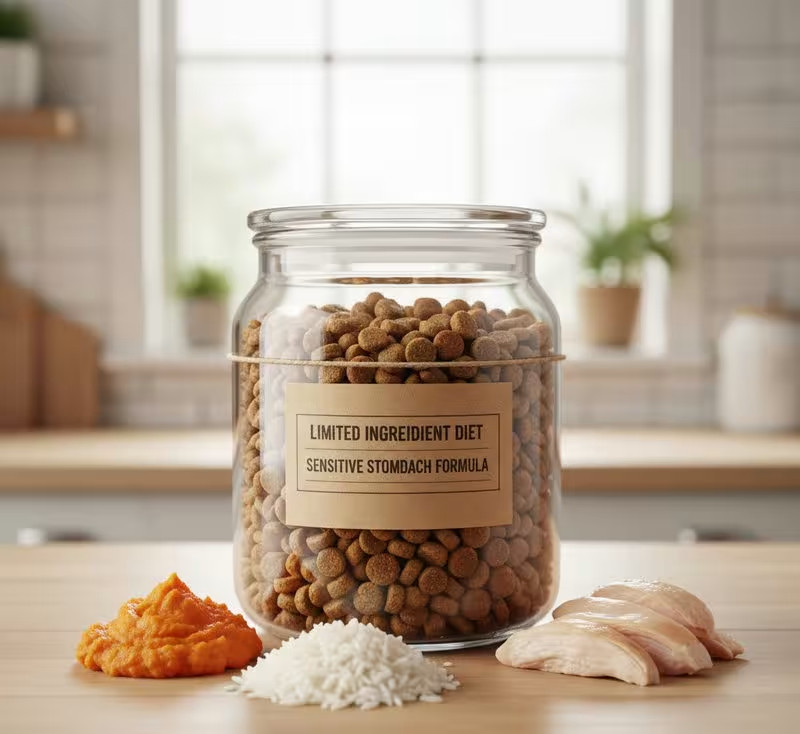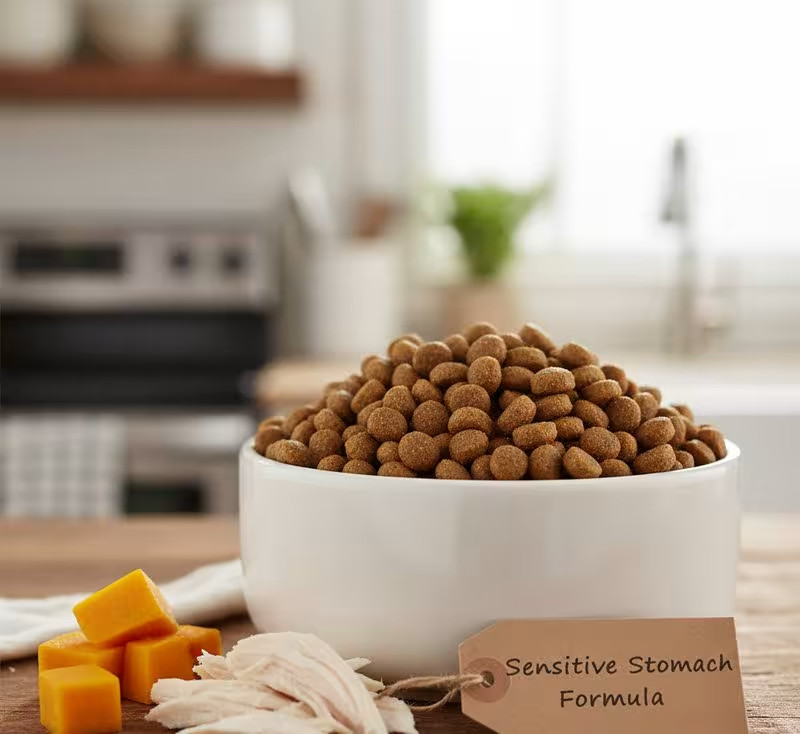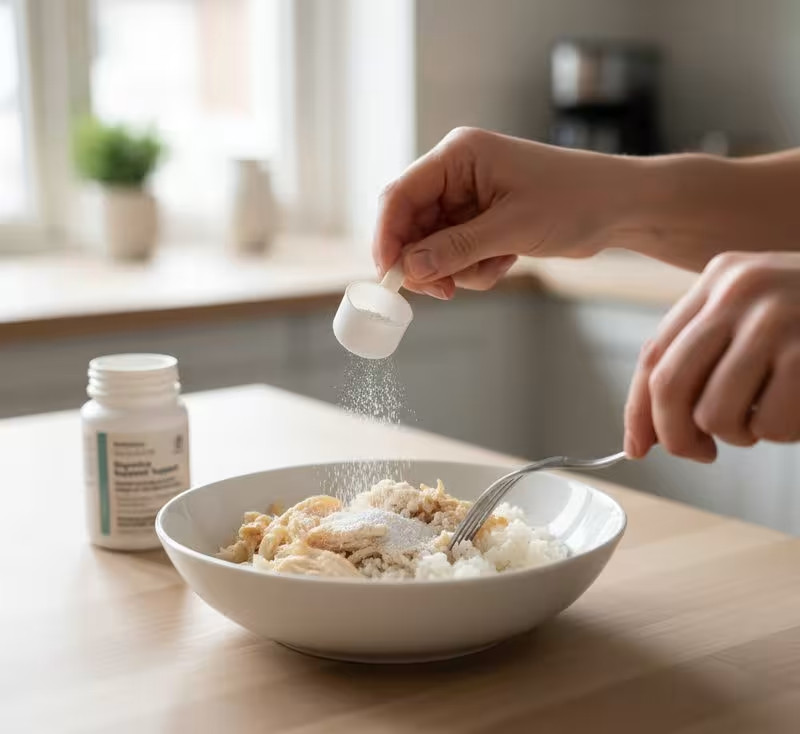Optimizing Nutrition for Dogs with Digestive Issues: A Comprehensive Guide

As devoted dog owners, few things are as distressing as watching our beloved companions struggle with digestive upset. From occasional bouts of diarrhea to chronic vomiting, digestive issues can significantly impact a dog's quality of life and even hint at underlying health problems. The good news? For many dogs, the solution, or at least a significant part of it, lies in their bowl. Choosing the right nutrition for dogs with digestive issues isn't just about alleviating symptoms; it's about fostering a healthy gut microbiome, ensuring proper nutrient absorption, and promoting overall well-being.
This comprehensive guide delves deep into the world of canine digestive health, offering data-driven insights, practical feeding strategies, and a detailed comparison of top dog food brands specifically formulated for sensitive stomachs. Our goal is to equip you with the knowledge to make informed decisions, transforming your dog’s mealtimes into a source of comfort and health.
Understanding Canine Digestive Issues
Before we can address how to feed a dog with a sensitive stomach, it's crucial to understand what constitutes a digestive issue and its potential origins. The canine digestive system is a complex ecosystem, and when it’s out of balance, a myriad of problems can arise.
Common Symptoms of Digestive Upset in Dogs
Recognizing the signs early is key. Symptoms can range from mild to severe and include:
- Vomiting: Can be acute (sudden) or chronic (lasting over days/weeks).
- Diarrhea: Loose or watery stools, can be frequent.
- Constipation: Straining to defecate, hard, dry stools.
- Loss of Appetite (Anorexia): Refusal to eat or decreased food intake.
- Lethargy: Reduced energy and activity levels.
- Abdominal Pain/Discomfort: Restlessness, hunched posture, sensitivity to touch.
- Flatulence: Excessive gas.
- Weight Loss: Unexplained decrease in body mass.
- Poor Coat Quality: Dull, dry, or brittle fur.
- Regurgitation: Bringing up undigested food, typically shortly after eating.
Root Causes: Why Do Dogs Develop Digestive Problems?
The reasons for digestive issues are diverse. They can be acute, resolving quickly, or chronic, requiring long-term management.
- Dietary Indiscretion: Eating something they shouldn't (e.g., garbage, human food scraps).
- Food Sensitivities or Allergies: Adverse reactions to specific ingredients, often proteins.
- Sudden Diet Changes: Introducing new food too quickly.
- Parasites: Intestinal worms or protozoa (e.g., Giardia).
- Bacterial Imbalances: Dysbiosis in the gut microbiome.
- Infections: Viral (e.g., Parvovirus) or bacterial infections.
- Inflammatory Bowel Disease (IBD): A chronic condition causing inflammation of the GI tract.
- Pancreatitis: Inflammation of the pancreas.
- Exocrine Pancreatic Insufficiency (EPI): Inability to produce enough digestive enzymes.
- Organ Disease: Liver or kidney problems can indirectly affect digestion.
- Stress and Anxiety: Psychological factors can manifest as digestive upset.
The Foundation of a Digestive-Friendly Diet
Crafting a diet for a dog with digestive issues means focusing on digestibility, quality ingredients, and gut support. Here’s what to prioritize:
The Role of Protein: Quality Over Quantity
Protein is essential, but for sensitive stomachs, the source and digestibility are paramount. Opt for novel proteins (like duck, venison, lamb, or fish) if common proteins (chicken, beef) are suspected culprits, or highly digestible animal proteins. Hydrolyzed proteins, where proteins are broken down into tiny molecules, can also be beneficial as they are less likely to trigger an immune response.
Essential Fats for Gut Health and Energy
Fats are a concentrated energy source, but too much can overwhelm a sensitive system, especially in conditions like pancreatitis. Look for moderate fat levels (typically 10-18% on a dry matter basis) from easily digestible sources like chicken fat or fish oil. Omega-3 fatty acids (EPA and DHA) are particularly beneficial for their anti-inflammatory properties, supporting gut lining health.
Fiber's Crucial Role: Soluble vs. Insoluble
Fiber is often a forgotten hero in digestive health. It acts as a prebiotic, feeding beneficial gut bacteria, and helps regulate bowel movements. A balance of soluble fiber (found in pumpkin, psyllium husk, beet pulp), which dissolves in water and forms a gel, and insoluble fiber (found in whole grains, cellulose), which adds bulk to stool, is ideal. Soluble fiber can help firm up loose stools, while insoluble fiber can alleviate constipation.
Carbohydrates: Finding the Right Balance
Easily digestible carbohydrates like rice (especially white rice), oats, and sweet potatoes provide energy without burdening the digestive system. Avoid complex, hard-to-digest carbohydrates and excessive fillers that offer little nutritional value and can irritate a sensitive gut.
Probiotics and Prebiotics: Gut Microbiome Support
A healthy gut relies on a balanced microbiome. Probiotics are live beneficial bacteria that can be supplemented to reintroduce healthy flora, while prebiotics are non-digestible fibers that act as food for these good bacteria. Together, they create a symbiotic relationship vital for optimal digestion and immune function.
Hydration: Often Overlooked, Always Important
Adequate water intake is critical for digestive function. It helps move food through the digestive tract, softens stools, and prevents dehydration, especially if your dog is experiencing vomiting or diarrhea. Always ensure fresh, clean water is readily available.
Choosing the Best Dog Food for Sensitive Stomachs
The market is flooded with options, making it challenging to pinpoint the ideal food. Here’s a breakdown of common categories and considerations:
Limited Ingredient Diets (LIDs): A Closer Look
LIDs are specifically formulated with a minimal number of ingredients, typically featuring a single protein source and a single carbohydrate source. This simplicity reduces the chances of triggering adverse food reactions. They are an excellent starting point for dogs with suspected food sensitivities or allergies.

When selecting an LID, scrutinize the ingredient list to ensure it truly is limited and doesn't contain hidden allergens or excessive fillers. Common LID ingredients often include novel proteins like salmon, duck, or lamb, paired with easily digestible carbs like sweet potato or rice.
Hydrolyzed Protein Diets: Advanced Solutions
For dogs with severe food allergies or inflammatory bowel disease, veterinarians often recommend hydrolyzed protein diets. In these formulas, animal proteins are broken down into molecules so small that the dog's immune system doesn't recognize them as allergens. This drastically reduces the likelihood of an allergic reaction or digestive upset.
Veterinary-Prescribed Therapeutic Diets
For complex or chronic conditions, your vet might prescribe a therapeutic diet. These are specialized formulas designed to manage specific medical conditions (e.g., gastrointestinal support, low-fat diets for pancreatitis, hypoallergenic diets). They are often highly palatable and formulated with specific nutrient profiles to aid recovery and long-term management.
Grain-Free vs. Grain-Inclusive: What's Best?
The debate over grain-free diets has been a hot topic. While some dogs genuinely have grain sensitivities (though less common than protein sensitivities), many grain-free diets replace grains with high-glycemic starches like potatoes or peas, which aren't necessarily better for all dogs. For some, whole grains like rice and oats can actually be excellent sources of digestible fiber and energy, promoting gut health. The key is identifying individual sensitivities, not broadly eliminating an entire food group without cause. Always consult your vet.
Top Dog Food Brands for Digestive Issues: A Data-Driven Comparison
To provide concrete recommendations, we've analyzed some of the most popular and veterinarian-recommended brands offering formulas for sensitive stomachs. This data-driven comparison focuses on key nutritional facts, ingredients, and cost effectiveness to help you make an informed choice. Please note that exact formulations and pricing can vary by region and specific product lines, so always check the latest label.

| Brand & Formula | Key Ingredients | Protein / Fat / Fiber (Min/Max %) | Estimated Price/lb | Pros (Digestive Focus) | Cons (Potential Drawbacks) |
|---|---|---|---|---|---|
| Hill's Science Diet Adult Sensitive Stomach & Skin (Chicken Recipe) | Chicken, Brewers Rice, Chicken Meal, Yellow Peas, Cracked Pearled Barley, Whole Grain Sorghum, Egg Product, Soybean Oil, Beet Pulp, Flaxseed. | Protein: 21% / Fat: 14% / Fiber: 4% | $3.00 - $3.50 | Highly digestible ingredients, prebiotic fiber (beet pulp) for gut flora, Omega-6s for skin barrier. Often vet-recommended for general sensitivities. | Lower protein content compared to some, uses common protein (chicken) which can be an allergen for some dogs. |
| Royal Canin Veterinary Diet Gastrointestinal Low Fat (Dry) | Brewers Rice, Chicken By-Product Meal, Wheat, Barley, Natural Flavors, Dried Plain Beet Pulp, Chicken Fat, Salt, Fish Oil, Psyllium Seed Husk. | Protein: 28% / Fat: 6.5% / Fiber: 2.5% | $3.50 - $4.00 | Very low fat, crucial for pancreatitis or fat maldigestion. Highly digestible proteins and prebiotics (beet pulp, psyllium). Veterinary exclusive formula. | Higher cost, uses chicken by-product meal and wheat which some owners prefer to avoid, requires vet prescription. |
| Purina Pro Plan Sensitive Skin & Stomach (Salmon & Rice Formula) | Salmon, Barley, Rice, Oat Meal, Canola Meal, Fish Meal, Animal Fat Preserved With Mixed-Tocopherols, Salmon Meal, Dried Yeast, Chicory Root Inulin. | Protein: 26% / Fat: 16% / Fiber: 3% | $2.50 - $3.00 | Real salmon as first ingredient (novel protein for some). Contains oat meal and rice for easy digestion, with chicory root as a prebiotic. | Can be too rich for extremely sensitive or low-fat required conditions. Contains grains, which some owners mistakenly wish to avoid. |
| Blue Buffalo Basics Limited Ingredient Diet (Turkey & Potato Recipe) | Deboned Turkey, Potatoes, Turkey Meal, Pea Starch, Peas, Tapioca Starch, Canola Oil, Pea Protein, Pumpkin, Flaxseed, Dried Chicory Root. | Protein: 20% / Fat: 12% / Fiber: 5% | $2.80 - $3.30 | Single animal protein source (turkey). Free from chicken, beef, corn, wheat, soy, dairy, eggs. Includes pumpkin for digestive support and prebiotics. | Lower protein and fat for some active dogs. High in peas/potatoes which aren't ideal for every dog's system. |
| Instinct Limited Ingredient Diet Grain-Free Recipe (Lamb Meal) | Lamb Meal, Peas, Tapioca, Canola Oil, Lamb, Coconut Meal, Natural Flavor, Montmorillonite Clay, Vitamins, Minerals. | Protein: 29% / Fat: 19% / Fiber: 4% | $3.20 - $3.80 | High protein from novel source (lamb). Grain-free for those seeking that option. Contains Montmorillonite Clay for digestive health. | Higher fat content might not suit all sensitive conditions. Can be more expensive than mainstream options. |
Beyond Kibble: Exploring Other Dietary Options
While dry kibble is common, other formats can also be beneficial for dogs with digestive issues.
Wet Food and Canned Diets for Digestion
Wet food typically has a higher moisture content, which can be easier to digest and more palatable for dogs with poor appetite. Many brands offer canned versions of their sensitive stomach formulas. The higher moisture can also help with hydration and soften stools, aiding constipation. However, some wet foods can be richer and may not suit all dogs, especially those needing a low-fat diet.
Homemade Diets: Pros, Cons, and Caution
Homemade diets can offer complete control over ingredients, making them attractive for owners managing severe sensitivities. A bland diet of boiled chicken and plain white rice is a common short-term remedy for upset stomachs. However, formulating a nutritionally complete and balanced long-term homemade diet is incredibly challenging and requires careful planning with a board-certified veterinary nutritionist to avoid nutrient deficiencies or excesses. Simply feeding chicken and rice long-term is dangerous and can lead to serious health problems.
Raw Diets: Understanding the Risks and Benefits
Raw feeding (BARF or Prey Model Raw) advocates claim improved digestion, coat, and energy. However, raw diets carry significant risks, including bacterial contamination (Salmonella, E. coli) that can harm both dogs and humans, and the potential for nutritional imbalances if not meticulously prepared. For dogs with compromised immune systems or digestive issues, the risks often outweigh the potential benefits. Always discuss extensively with your vet before considering a raw diet.
Supplements and Probiotics for Digestive Health
Supplements can play a supportive role in managing digestive issues, working alongside a tailored diet.
When and How to Use Probiotics and Prebiotics
Probiotics introduce beneficial bacteria to the gut, helping restore balance, particularly after antibiotic use, stress, or episodes of diarrhea. Prebiotics, like FOS (fructooligosaccharides) or inulin (from chicory root), feed these good bacteria. They can be given daily as a preventative measure or specifically during times of digestive upset. Choose veterinary-specific probiotic strains for dogs, as human probiotics may not be effective. Consult your vet to determine the best strain and dosage for your dog.

Digestive Enzymes: Aiding Nutrient Absorption
Dogs with Exocrine Pancreatic Insufficiency (EPI) lack the enzymes needed to properly digest food. For these dogs, enzyme supplements (typically powdered pancreatic enzymes) are mixed with food to aid digestion and nutrient absorption. Other dogs with less severe maldigestion might also benefit from enzyme support, though this should always be guided by veterinary diagnosis.
Other Beneficial Supplements
- Psyllium Husk: A source of soluble fiber, excellent for regulating bowel movements (both diarrhea and constipation).
- Slippery Elm Bark: Forms a protective mucilage that can soothe inflamed digestive tracts.
- Ginger: Can help alleviate nausea and upset stomach.
- L-Glutamine: An amino acid that supports the integrity and repair of the intestinal lining.
Practical Feeding Strategies for Sensitive Stomachs
Beyond what you feed, how you feed can significantly impact a dog with digestive issues.
Gradual Transitioning: Avoiding Sudden Changes
When changing your dog's food, always do so gradually over 7-10 days. Start by mixing 25% new food with 75% old food for a few days, then move to 50/50, then 75% new/25% old, before fully transitioning. This allows your dog's digestive system to adapt and minimizes upset.
Portion Control and Meal Frequency
Overfeeding can overwhelm a sensitive digestive system. Stick to recommended portion sizes and consider feeding smaller, more frequent meals (e.g., 3-4 times a day instead of 1-2 large meals). This reduces the burden on the stomach and intestines, promoting smoother digestion.
The Importance of a Calm Eating Environment
Stress and anxiety can exacerbate digestive problems. Ensure your dog has a quiet, undisturbed place to eat. Avoid feeding immediately after vigorous exercise or during times of household commotion. A calm environment promotes proper digestion.
Monitoring and Adjusting Your Dog's Diet
Keep a close eye on your dog's stool consistency, appetite, energy levels, and any recurrence of symptoms. A food diary can be incredibly helpful for tracking what works and what doesn't. Be prepared to adjust the diet or supplements as needed, always in consultation with your veterinarian.
When to Consult Your Veterinarian
While diet plays a critical role, not all digestive issues can be resolved solely through nutrition. Knowing when to seek professional help is vital.
Recognizing Red Flags and Persistent Symptoms
If your dog experiences severe vomiting or diarrhea (especially with blood), extreme lethargy, prolonged loss of appetite (more than 24 hours), or abdominal pain, seek immediate veterinary attention. Chronic or recurring digestive issues, even if mild, warrant a vet visit to rule out underlying conditions. Don't delay if symptoms worsen or persist.
The Role of Veterinary Diagnostics
Your veterinarian can perform diagnostic tests such as fecal exams, blood work, imaging (X-rays, ultrasound), or even biopsies to pinpoint the exact cause of digestive problems. Accurate diagnosis is the first step toward effective treatment and long-term management.
Frequently Asked Questions (FAQ)
What is the best food for a dog with an upset stomach?
For a temporary upset stomach, a bland diet of plain, boiled, skinless chicken breast and white rice (in a 1:2 ratio, e.g., 1 cup chicken to 2 cups rice) is often recommended by vets. For chronic issues, a veterinarian-prescribed therapeutic diet or a high-quality limited ingredient diet (LID) specifically formulated for digestive sensitivity is usually best. Always consult your vet before making significant dietary changes.
What human food can I give my dog for an upset stomach?
Besides plain boiled chicken and white rice, other safe human foods for a temporary upset stomach include:
- Cooked Pumpkin: Plain, canned pumpkin (not pie filling) is an excellent source of soluble fiber to help firm up stool or relieve mild constipation.
- Boiled Sweet Potato: A digestible carbohydrate and source of fiber.
- Plain Yogurt or Kefir: Small amounts of unsweetened, plain yogurt or kefir (with live active cultures) can provide probiotics, but avoid if your dog is lactose intolerant.
- Oatmeal: Plain, cooked oatmeal (without sugar or additives) can be a gentle source of fiber.
Always introduce new foods slowly and in small quantities, and avoid any foods known to be toxic to dogs (e.g., onions, garlic, chocolate, grapes).
How can I improve my dog's digestion naturally?
Natural ways to support canine digestion include:
- High-Quality Diet: Feed a diet with digestible, whole ingredients.
- Probiotic/Prebiotic Supplements: Introduce beneficial bacteria and their food.
- Adequate Hydration: Ensure constant access to fresh water.
- Avoid Overfeeding: Smaller, more frequent meals can be easier on the system.
- Manage Stress: Create a calm environment.
- Regular Exercise: Promotes healthy gut motility.
- Avoid Table Scraps: Human foods are often too rich or contain ingredients harmful to dogs.
What are signs of a dog with digestive issues?
Common signs include vomiting, diarrhea, constipation, excessive gas, loss of appetite, lethargy, weight loss, abdominal pain (hunched posture, sensitivity), and poor coat quality. Any persistent or severe symptoms warrant a vet visit.
Can grain-free food cause digestive issues in dogs?
While grain-free diets are often chosen for sensitive stomachs, they are not always superior and can sometimes cause issues. Replacing grains with high amounts of legumes (peas, lentils) or potatoes can sometimes lead to digestive upset in some dogs. Additionally, there's an ongoing investigation into a potential link between certain grain-free diets and Dilated Cardiomyopathy (DCM). It's crucial to consult your veterinarian before choosing a grain-free diet.
How long does it take for a dog to adjust to new food?
It typically takes 7-10 days for a dog to fully adjust to a new food when transitioning gradually. Some dogs with very sensitive stomachs might need a longer, slower transition (up to 2-3 weeks). If digestive upset occurs during the transition, slow down the process further or consult your vet.
Conclusion

Navigating nutrition for dogs with digestive issues can feel overwhelming, but with the right knowledge and a proactive approach, you can significantly improve your dog's health and happiness. Remember that every dog is an individual, and what works for one may not work for another. The journey often involves careful observation, patience, and a willingness to adapt.
Prioritize high-quality, digestible ingredients, consider limited ingredient diets or therapeutic formulas, and don't underestimate the power of prebiotics and probiotics. Most importantly, always partner with your veterinarian. They are your best resource for diagnosing underlying conditions and tailoring a nutritional plan that ensures your beloved companion thrives. With a thoughtful and informed approach to their diet, you can help your dog enjoy a life full of vitality and comfort, free from digestive distress.


 By
By
Thank you for engaging with our comprehensive guide on optimizing nutrition for dogs with digestive issues. As Dr. David Miller, I truly hope this resource empowers you. Remember, the two most critical takeaways are that **tailored nutrition is fundamental for fostering a healthy gut microbiome and overall well-being**, extending beyond mere symptom relief, and **understanding the underlying causes of your dog's digestive issues is paramount** for effective, lasting management. While our insights are data-driven, please always consult your veterinarian. They are your best partner in diagnosing specific conditions and crafting a personalized dietary plan, ensuring your beloved companion receives the precise care they deserve.
This guide is incredibly thorough! I really appreciate the 'data-driven insights' and the promise of a 'detailed comparison of top dog food brands.' It's exactly what I needed to cut through all the conflicting advice out there about sensitive stomachs. Feels like a genuinely reliable resource.
My Beagle has been struggling with chronic vomiting for months, and I'm at my wit's end. I'm really looking forward to the 'detailed comparison of top dog food brands.' Can you suggest a good starting point for a dog with very severe symptoms from the brands you'll be recommending?
The guide talks about choosing the 'right nutrition' to foster a 'healthy gut microbiome.' Are there any specific probiotic-rich food brands that you'll be highlighting in your comparison section? Trying to decide between a few options for my sensitive pup.
I always worry that 'sensitive stomach' foods are just a marketing ploy to charge more. Does your guide touch on how to find effective, high-quality options that won't break the bank? It's tough balancing budget with my dog's well-being, especially with chronic issues.
Thank you for this! My Golden Retriever, Max, has had 'occasional bouts of diarrhea' for years, and it's heartbreaking to see him uncomfortable. This article gives me so much hope that we can finally get his digestive issues under control by changing his food. I feel so much less alone.
This article hit home. Watching my little terrier mix, Luna, struggle with unexplained vomiting has been one of the most 'distressing' experiences. It’s validating to hear that finding the right food really is a crucial step, not just a shot in the dark. Can't wait to dive into the brand comparisons.
This is an excellent overview! Beyond food changes, do you have any quick tips on how to properly transition a dog to a new sensitive stomach food to avoid further upset? Sometimes the transition itself is a challenge, even with the right food.
Wow, this is truly a 'comprehensive guide.' I've bookmarked this page already because the information on 'understanding canine digestive issues' and recognizing symptoms is so clearly laid out. This is now my go-to resource for dog digestive health!
Finally, a website that offers 'data-driven insights' instead of just generic advice! This article has immediately established this site as a trustworthy source for canine health. Will definitely be sharing this with my dog-owner friends who are also dealing with digestive struggles.